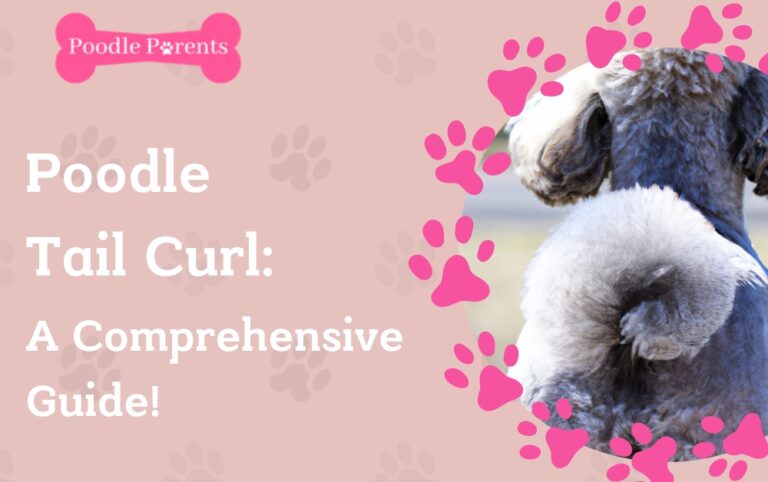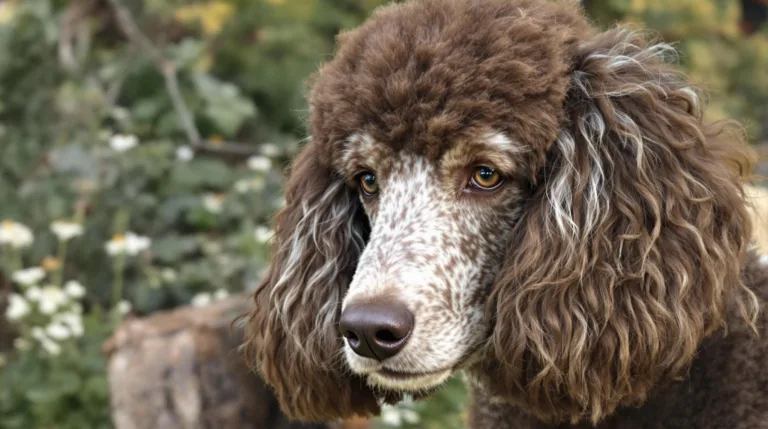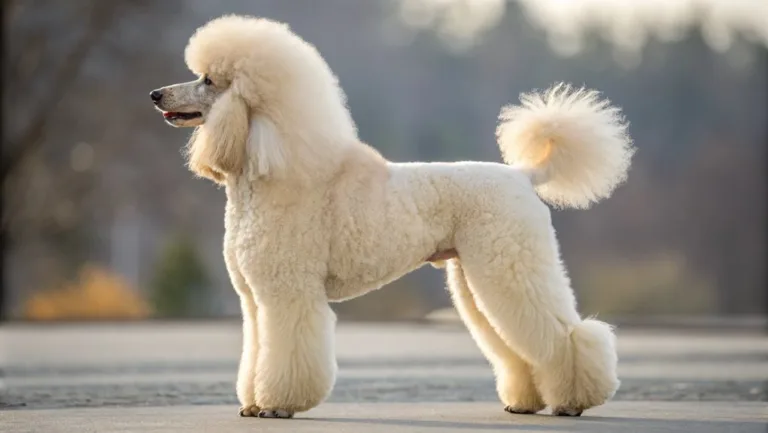Do Poodles Howl? Here’s What You Need to Know
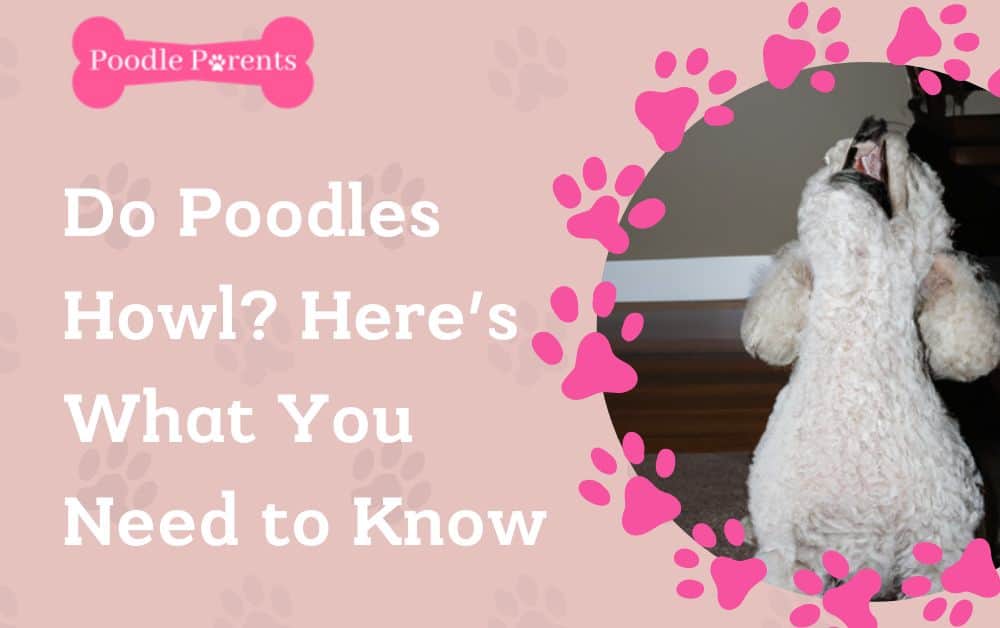
Do poodles howl? Poodles are known to be quiet, gentle dogs, but they can make quite a noise when given a chance!
In this article, I’ll look at why poodles might howl and what it means if they do. You’ll also learn some tips on how to stop your pup from making too much noise if needed.
So let’s dive right in and explore the fascinating world of these soft-spoken yet sometimes vocal four-legged friends!
Poodles have long been known to be among the most well-behaved breeds.
They generally don’t bark or whine excessively, making them great pets for those who don’t want too much commotion indoors.
However, like all other animals, they still need to express themselves, and sometimes their inner wolf comes out with a loud howl!
There are several reasons why poodles might choose to give voice to their emotions – excitement, fear, pain, or simply boredom.
Let’s learn more about why these lovable characters might sing along with the wolves now and then.
Overview Of Canine Howling
The sound of a howl echoing across the night sky has been heard in horror movies and fairytales alike. It’s an iconic noise associated with wild wolves howling.
Still, it’s not just limited to them: many dog breeds can howl too. This brings us to our question – do poodles howl? To answer this, let’s look at why dogs howl in the first place.
Howling is a way for canines (wolves and domestic dogs) to communicate over long distances, much like humans use phones or radios.
Wolves may also howl when they feel threatened or want to find their pack members after becoming separated from them.
Dogs usually inherit this behavior from their wolf-like ancestors, so if your Poodle starts howling, it could be because of its heritage!
Different types of poodles may exhibit different vocalization levels; toy poodles are especially likely to make a lot of noise due to their small size and higher energy levels.
Notice your pup starting to ‘talk’ more than usual. Perhaps they’re trying to communicate something important, or is it playtime?
All things considered, the answer is yes: some poodles have the ability to howl. Now that we understand what motivates poodles (and other dogs) to break out into song, let’s move on and explore which particular breeds tend towards this type of vocalization…
Poodle Breeds That Are Prone To Howling

Poodles of all shapes and sizes tend to howl when they feel lonely or anxious.
Some poodle breeds, like the toy poodle, can sometimes be more prone to howling than others because of separation anxiety.
While it may not be known if every individual Poodle knows how to howl or not howl, some understand that it’s an instinctive behavior among their breed, which is why they do it.
The good news is that most owners find this trait endearing in their pets. They often accept the occasional barking or yipping from them as part of life with a furry companion.
The bad news is that if your pup learns how to howl, you might find yourself dealing with louder and louder noises coming from your pet over time.
In addition to being used by dogs for communication purposes, howling can also be used as a form of self-expression, so if yours begins to engage in a such activity regularly, don’t worry too much about it – make sure you give him plenty of love and attention!
By knowing what breeds are prone to howling and understanding why these particular pooches partake in such behavior, you’ll be better prepared for any situation regarding your canine friend’s vocalizations.
Reasons Why Poodles May Howl
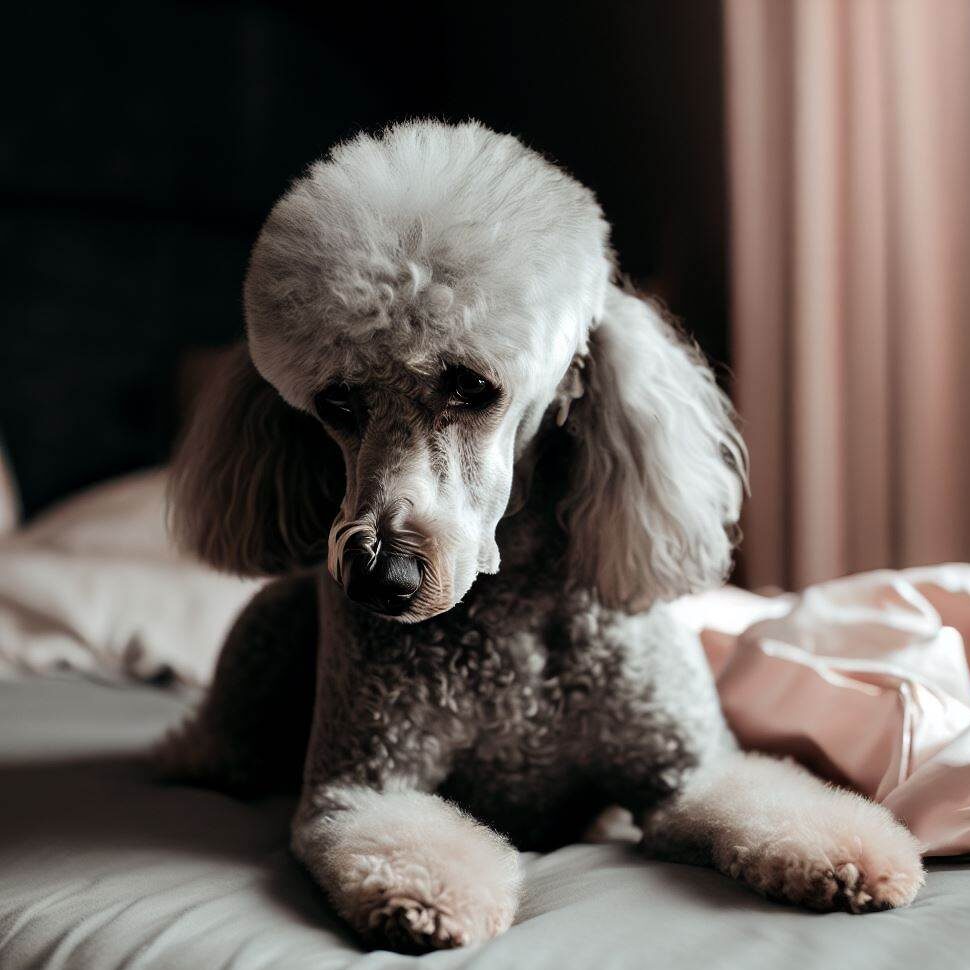
Poodles may howl for a variety of reasons. They may be trying to communicate with other animals or humans, expressing excitement at something they’ve seen, or even expressing feelings of fear, sadness, or even recollecting a mournful moment.
The most common reason poodles might howl is that they feel lonely.
When a poodle has been separated from its family members or friends, it may let out a long, loud howl as if calling out for them.
Another example is when a female poodle is in season, and the male has been separated from them. He will often howl and be upset as his natural instinct kicks in to breed.
It’s also possible that when poodles hear certain sounds like sirens or thunderstorms, they can become scared and start to howl in response.
This could result from being startled by sudden noises that seem unfamiliar or strange compared to normal everyday sounds.
Finally, some experts suggest that poodles may howl just for the joy of making noise – after all, singing along with us is one way they show affection!
No matter the exact cause, it’s clear that there are many situations where a poodle will attempt to use its unique vocalizations to express itself.
Understanding why your pet might be compelled to howl can help you better understand their behavior and provide comfort when necessary.
Next, we’ll explore the difference between barking and howling so you can differentiate between the two types of vocalization.
The Difference Between Barking And Howling

Did you know that barking is a form of communication for dogs? At the same time, howling is primarily used to communicate long distances.
Some Poodles are often viewed as lapdogs because of their smaller size, but they can still bark and howl like any other breed. So the question remains: do poodles howl?
Barking tends to be an immediate response when something has caught the dog’s attention.
It could be another animal or person walking by, loud noises from outside, or even just noticing someone new in its environment.
The barking sound will rise and fall depending on what’s catching its attention. Howling, however, is more intentional than barking; it allows dogs to communicate across longer distances than barking would allow.
According to the American Kennel Club, our domesticated wolves can successfully communicate with each other up to several miles away using only howls!
Though they might not have this same level of vocal range compared to larger breeds such as huskies or malamutes, poodles can still produce distinct sounds through barking and howling.
When trying to determine whether your pup is trying to communicate something specific through howling, though, there are sure signs you should look out for.
Signs That A Poodle Is Howling To Communicate
First and foremost, watch your pup’s body language. Suppose their ears perk up, and they start pacing around or looking at something in the distance.
In that case, this could indicate curiosity or excitement. They may also tilt their head back while making a howl.
This type of behavior suggests they’re trying to get your attention.
Another indication that your Poodle is trying to communicate with you through howling is if they seem distressed when left alone for long periods.
You can buy pet cameras for your home if you suspect your dog is howling when you are apart.
These cameras give a great insight into your furry friend’s behavior, and some even allow you to talk to calm your Poodle.
If you’re away from home during the day, try taking them on more walks or providing them with interactive toys so they don’t feel isolated.
Suppose these behaviors persist despite attempts to alleviate their distress.
In that case, it’s best to consult an animal behavior expert who can provide guidance on training tips for encouraging positive howling behaviors.
Training Tips For Encouraging Positive Howling Behaviors

Now that you know the signs of howling and what it means, it’s time to discuss training tips for encouraging positive howling behaviors.
To start, give your pup plenty of attention when they appropriately do howl. Show them love and praise, so they learn that this behavior is desirable.
Additionally, make sure not to overreact or reprimand them if their howls are too loud or frequent; instead, focus on redirecting their energy towards something more constructive such as a toy or game.
It’s also essential to provide ample opportunities for your Poodle to practice good howling habits.
Take some time each day to play with them, take walks together, and engage in other activities that can help strengthen the bond between you two while releasing pent-up energy.
Rewarding positive behaviors will ensure your pet knows what behavior is expected from them going forward.
These are some methods to teach your Poodle to howl
- Try singing to your dog.
- Howl to your dog.
- Play videos of other dogs howling.
- Sirens can be used (be careful it’s not overly loud or high-pitched).
- Use whistles.
Later you can associate a word with the action for an on-cue performance using such words as “sing.”
Using these methods should increase the odds of your four-legged friend’s ability to learn to howl, but please don’t proceed if your dog isn’t enjoying the experience.
Another consideration is that these methods may make your dog more likely to howl when you don’t want them to! Take this into account before you proceed.
Ways To Discourage Negative Or Excessive Howling Habits
Like a thunderstorm, excessive poodle howling can be distressing for the pet and its owners.
But with patience and understanding, you can help prevent your pup from developing negative or excessive howling habits.
To put it simply: prevention is better than cure.
Here are some helpful tips to discourage unwanted howling in your furry companion:
| Tip | Description |
| Exercise Regularly | Daily exercise helps keep them physically fit and mentally stimulated |
| Monitor Noise Levels | Keep loud noises at bay by keeping windows closed when noise levels are high (e.g., during fireworks displays) or using ear muffs if needed |
| Reinforce Positive Behaviors | Whenever they bark appropriately, reward them with treats or extra playtime to reinforce positive behaviors |
| Provide Things To Do | Give your pup things to do like puzzle toys so that their minds stay busy instead of fixating on making noise |
Following these steps can minimize any potential distress caused by excessive howling. It may take time, but eventually, you will reach a point where your beloved pooch no longer needs to express itself through vocalization.
This newfound peace and quiet bring greater satisfaction and joy to all involved! Let’s look into health conditions that could cause unwanted Poodle howling.
Health Conditions That Could Cause Unwanted Poodle Howling
It’s essential to be aware of possible health conditions that could cause unwanted howling in poodles.
While some owners may think their pet is just annoying, underlying medical issues could be at play.
Knowing the signs and symptoms of these illnesses can help you determine if your pup needs veterinary attention.
Pain or discomfort is the most common medical condition among poodles that lead to excessive howling.
Suppose your pup begins suddenly exhibiting signs of distress such as restlessness, yowling, whining, or pacing around constantly.
In that case, they may tell you something isn’t quite right. This could include but is not limited to:
- Ear infections
- Joint problems
- Age-related arthritis or hip dysplasia
- Dental disease
- Infections in internal organs such as the heart or liver, or even cancerous tumors.
It’s imperative to take your pup for a checkup with the vet immediately so any physical ailments can be addressed promptly.
By learning what behaviors are typical for your canine companion and staying alert for changes in those behaviors, along with recognizing warning signs related to potential health concerns, you can ensure your and your pup’s well-being now and into the future!
With this knowledge under our belt, let’s turn our attention to ways we can determine if our beloved Poodle is experiencing pain and needs urgent veterinary attention…
Ways To Determine If Your Poodle Is In Pain And Needs Veterinary Attention
Even if your Poodle does not howl a lot, it doesn’t mean they aren’t in pain. These are some telltale signs your dog may need help.
First off, observe any changes in behavior. Suppose they become more sluggish than usual or are less interested in food or activities. In that case, these could be signs of discomfort or illness.
Changes in their sleeping habits may also suggest an issue with their health. Additionally, watch out for excessive licking or itching, sometimes indicating allergies or other problems.
Finally, make sure you check your pup regularly for any lumps on their skin that weren’t there previously. It’s always best to have them checked by a vet if you notice anything unusual so the problem can be identified early and addressed quickly.
So now that we’ve taken a closer look at ways to tell if your Poodle is unwell, it’s time to take a peek into the genetics behind why some poodles might howl—and others don’t!
A Look At The Genetics Of Poodle Howls
Expressive barks and howls. Have you ever wondered where your pup gets it from?
The answer lies in a combination of genetics and environment. The first thing to understand is that all dogs, not just poodles, can howl if they want to.
This instinctive behavior has been passed down through generations of domesticated animals since ancient times. I’m sure you are familiar with the Beagle. This hound can be extremely loud, but luckily Poodles don’t share this trait.
While Poodles can certainly bellow when they want to, they are not typically known for being a particularly vocal breed. In fact, many Poodle owners enjoy their relative quietness, particularly when compared to other breeds prone to barking excessively.
Of course, individual personalities and environmental factors can also play a role in how vocal a Poodle is, but in general, they are not the noisiest of dogs.
Most dogs have at least some capacity to produce this sound, but certain breeds are more likely to do so than others.
So why do poodles howl? Scientists believe that this trait was inherited from wolves – the ancestors of modern-day domestic dogs – who used howling as a warning call or communication tool between members of their pack.

Even today, wild wolf packs still use howling to communicate with each other over long distances. That same genetic tendency also appears alive and well within the poodle population!
Poodles may also learn how to howl from their human owners if they hear them making noises like whistling or singing around the house.
Whether or not a particular pup expresses its vocal talents depends on individual personality traits and life experiences. These two factors cannot always be controlled by us humans!
Different Types Of Poodle Barks & Howls
Let’s take an in-depth look into the different types of barks and howls that are typically heard from this breed. To make it easier for you to understand, here is a table listing each bark or howl with its associated description:
| Bark/Howl Type | Description |
| Yodel | Long and drawn-out sound |
| Whine | High pitched; usually when sad or scared |
| Growl | Low rumbling noise |
| Bark | Short, sharp sounds; can be high or low |
| Howl | Loud, long vocalizations |
While these noises have distinct differences, they all come together as one unique part of the poodle personality!
Poodles often use these sounds to express themselves – whether it’s excitement over seeing someone they love coming home or fear because they think something terrible is happening.
It’s essential to pay attention to your pup’s barks and howls so you can better understand what they might need from you.
Poodles may not be known for their loudness compared to other breeds, but they certainly know how to make their presence felt with their signature yodels, whines, and growls!
The following section explores breeds similar to the toy poodle that are prone to howling.
Breeds Similar To The Toy Poodle That Are Prone To Howl
No, poodles don’t usually howl in the same way that other larger dogs do. However, there are certain breeds similar to the toy poodle, which can be prone to vocalizing more than others.
Breeds such as Maltese, Shih Tzu, and Bichon Frise all share a common ancestry with the Toy Poodle and tend to make more noise than their cousins.
They may bark or whine when they want attention or feel threatened.
It’s important to note that some of these breeds have been bred specifically for companionship and therefore require lots of attention from their owners.
This means that if you’re looking for a quiet pet, one of these types might not be suitable for your home environment. On the other hand, if you’re prepared to give them plenty of love and affection, they could make excellent furry friends!
These breeds need more time dedicated to playtime and cuddles, so it’s best to research what type of temperament suits your lifestyle before bringing any new pet into your home.
With this knowledge in mind, we can now move on to – determining if a toy poodle is becoming anxious when it does not get enough attention.
Determining If A Toy Poodle Is Becoming Anxious When It Does Not Get Attention
Look for signs of distress to determine if your toy poodle is becoming anxious when it does not receive attention.
Your pup may start to bark or howl more frequently than usual, and display discontentment, such as:
- Pacing and restlessness.
- Become clingy towards you and other family members.
- Show a lack of interest in playing with toys or participating in activities they typically enjoy.
- Refrain from going outdoors.
- Exhibit destructive behaviors like chewing on furniture.
- Urinating on the carpeting.
- Attempt to hide from people and animals around them.
These are all indications that your pup needs more mental stimulation and companionship.
It’s important to note that some levels of barking are normal behavior for dogs since it is their primary means of communication.
However, loud howling can signify emotional unrest due to boredom or loneliness.
To avoid this kind of anxiety-induced vocalization from occurring in the first place, make sure your pup gets plenty of exercise throughout the day, along with interactive playtime activities where you both participate together.
You should also give them lots of snuggles and kisses so they feel secure and loved in your presence.
Taking proactive steps early on like these will help lessen any potential issues related to separation anxiety caused by an absence of affectionate interaction between you two.
From here, we can explore what else you can do to help curb your puppy’s need to howl into the late hours of the evening.
What Else You Can Do To Help Curb Your Puppy’S Need To Howl
The first step in curbing your puppy’s need to howl is understanding the environmental factors that influence it.
To do this, you should observe when and why he howls. Does he howl out of boredom or loneliness?
Is there a particular noise or activity that sparks his curiosity? Once you have identified these triggers, you can work on ways to minimize them.
You can also distract him with toys and activities whenever he starts to howl. This gives him something else to focus on instead of the noises around him.
Try to take him for regular walks outside so that he gets used to new sounds and sights.
Additionally, provide plenty of mental stimulation by teaching him basic commands like “sit,” “stay,” or “come”; play interactive games like tug-of-war or fetch, and give him enrichment items such as puzzle feeders or treat dispensers.
Lastly, ensure your pup has enough physical exercise throughout the day, so they are too exhausted to respond to their environment.
Provide ample opportunities for running, jumping, and playing—this will help tire them mentally and physically!
Taking these steps can help curb your puppy’s need to howl while maintaining a happy home life with your beloved pet.
Understanding The Environmental Factors That Influence Your Pet’s Tendency To Howl
Environmental factors play a huge role when it comes to an understanding why your pet may be prone to howling.
From the type of environment they live in and the amount of interaction they receive, there are many things that can affect their behavior.
Here is an overview of some of these environmental factors and what you can do to help reduce or prevent excessive howling:
| Environmental Factors | What You Can Do To Help |
| Too Much Noise | Provide a quiet space |
| Lack of Socialization | Take them on walks |
| Confinement | Give them toys and exercise opportunities |
| Fear | Introduce new people slowly |
These are just some environmental factors that could cause your pup to act out with excessive howling.
It’s essential to look for signs such as being overly vocal when situations arise. Some examples are loud noises or unfamiliar people entering their homes.
If this happens, try providing a distraction from whatever is causing the fear, such as playing music or giving them something special like a toy or treat.
By paying attention to environmental triggers and taking proactive steps based on the suggestions above, you can help ensure your puppy doesn’t develop unnecessary habits such as howling excessively.
Can A Toy Poodle Howl?
Can a Toy Poodle Howl? It’s a question many people ask when they think about getting this breed of dog.
The answer is yes, although not all poodles will howl – it depends on the individual animal. Some poodles are naturally more prone to howling than others.
There can be both good and bad aspects to having a poodle that howls. On the one hand, some owners find it endearing or amusing to hear their pets make these sounds.
But if your pet tends to howl too much, it can become annoying for you and your neighbors.
So it’s important to consider whether or not you want your Poodle to learn how to howl before bringing them home with you.
Not all poodles are purebreds; there are also mixed breeds out there that contain genes from other dogs as well.
Whether or not these mixed breeds will have an inclination towards howling may vary depending on which particular mix of genes has been passed down through their lineage.
Ultimately, only time will tell whether any puppy will grow into a hound-like pup who loves letting loose its inner wolf!
What Poodle Mixes Howl?
Now, we’ve answered the question, do poodles howl? Does Poodle mix breeds?
In fact, they can be just as vocal as any other dog breed, but it depends on their background and training.
As the saying goes, “When in Rome, do as the Romans do,” similarly, dogs were trained to howl by wolves. This behavior was passed down through generations of domesticated animals.
Regarding poodle mixes, some are more likely to have a more prominent howl than others due to genetics.
Here is a list of poodle mix breeds that have been known to howl:
- Labradoodle
- Goldendoodles
- Colliedoodles
- Sheltiedoodles
- Siberpoo
While not all poodle mixes may possess this trait, those listed above are most likely to inherit the tendency from their ancestors.
This doesn’t necessarily mean they’ll bark at every noise; instead, they may let out an occasional howl when feeling particularly happy or excited!
It’s essential to properly train them to know what behavior is acceptable or discouraged for your pet pooch and not create too much noise disruption for neighbors.
Interesting Facts About Poodles
Poodle breeds like Standard, Miniature, and Toy are known for their intelligence and loyalty, as well as their curly coats of fur.
They come in many colors, including black, apricot, silver beige, white cream, and grey.
Here is a list of other things to know about this breed:
- Highly social – Enjoys spending time with family
- Great learners – Easily trained intelligent dogs
- Low shedding – Hypoallergenic coat that needs regular grooming
- Affectionate – Very loyal companions who love to cuddle
Poodles can make excellent pets due to their easygoing nature and adaptability.
They can live up to 15 years or more with proper care, making them the perfect choice for households looking for a long-term companion.
If you’re considering getting one of these lovely canines as part of your family, don’t hesitate! Your Poodle will thank you for it by giving you endless love and the occasional snobby side-eye.
Conclusion
In conclusion, poodles can howl just like any other breed of dog. The key to understanding their vocal communication is recognizing the differences between barking and howling.
Knowing what breeds are most prone to howling, determining if a toy poodle is trying to communicate through howling, and being aware of environmental factors that influence your pet’s tendency to howl will help you better understand why your pup may be doing it.
Owners of poodles or similar breeds must stay vigilant in providing attention when required and curbing any anxious behavior before it escalates into unnecessary howling.
By keeping an eye on signs from your pup and remembering that they need love and attention, too, you can make sure you and your furry friend remain content with one another.
Let us all strive to build strong relationships with our four-legged friends by paying close attention to their needs!

